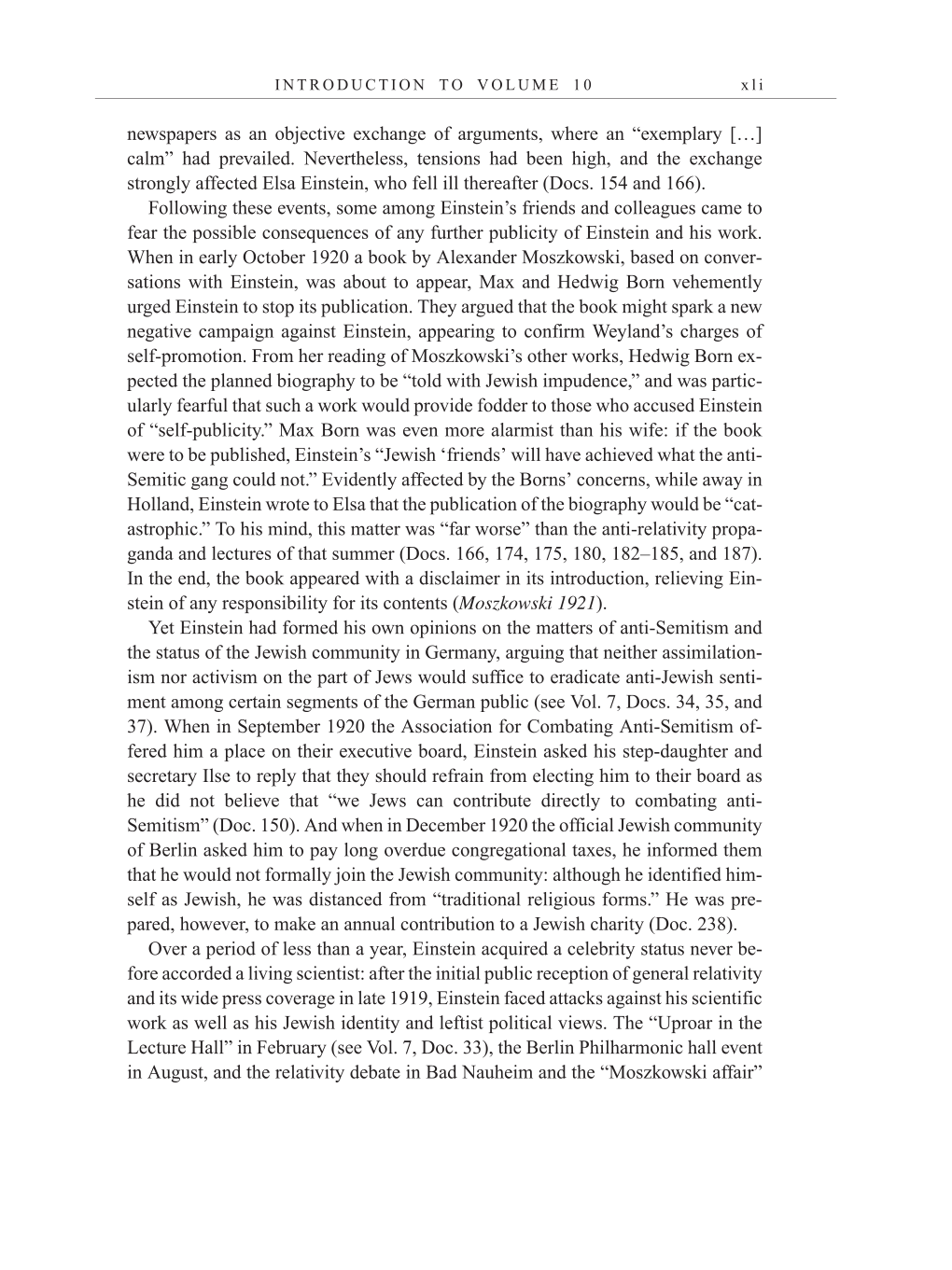I N T R O D U C T I O N T O V O L U M E 1 0 x l i
newspapers as an objective exchange of arguments, where an “exemplary […]
calm” had prevailed. Nevertheless, tensions had been high, and the exchange
strongly affected Elsa Einstein, who fell ill thereafter (Docs. 154 and 166).
Following these events, some among Einstein’s friends and colleagues came to
fear the possible consequences of any further publicity of Einstein and his work.
When in early October 1920 a book by Alexander Moszkowski, based on conver-
sations with Einstein, was about to appear, Max and Hedwig Born vehemently
urged Einstein to stop its publication. They argued that the book might spark a new
negative campaign against Einstein, appearing to confirm Weyland’s charges of
self-promotion. From her reading of Moszkowski’s other works, Hedwig Born ex-
pected the planned biography to be “told with Jewish impudence,” and was partic-
ularly fearful that such a work would provide fodder to those who accused Einstein
of “self-publicity.” Max Born was even more alarmist than his wife: if the book
were to be published, Einstein’s “Jewish ‘friends’ will have achieved what the anti-
Semitic gang could not.” Evidently affected by the Borns’ concerns, while away in
Holland, Einstein wrote to Elsa that the publication of the biography would be “cat-
astrophic.” To his mind, this matter was “far worse” than the anti-relativity propa-
ganda and lectures of that summer (Docs. 166, 174, 175, 180, 182–185, and 187).
In the end, the book appeared with a disclaimer in its introduction, relieving Ein-
stein of any responsibility for its contents (Moszkowski 1921).
Yet Einstein had formed his own opinions on the matters of anti-Semitism and
the status of the Jewish community in Germany, arguing that neither assimilation-
ism nor activism on the part of Jews would suffice to eradicate anti-Jewish senti-
ment among certain segments of the German public (see Vol. 7, Docs. 34, 35, and
37). When in September 1920 the Association for Combating Anti-Semitism of-
fered him a place on their executive board, Einstein asked his step-daughter and
secretary Ilse to reply that they should refrain from electing him to their board as
he did not believe that “we Jews can contribute directly to combating anti-
Semitism” (Doc. 150). And when in December 1920 the official Jewish community
of Berlin asked him to pay long overdue congregational taxes, he informed them
that he would not formally join the Jewish community: although he identified him-
self as Jewish, he was distanced from “traditional religious forms.” He was pre-
pared, however, to make an annual contribution to a Jewish charity (Doc. 238).
Over a period of less than a year, Einstein acquired a celebrity status never be-
fore accorded a living scientist: after the initial public reception of general relativity
and its wide press coverage in late 1919, Einstein faced attacks against his scientific
work as well as his Jewish identity and leftist political views. The “Uproar in the
Lecture Hall” in February (see Vol. 7, Doc. 33), the Berlin Philharmonic hall event
in August, and the relativity debate in Bad Nauheim and the “Moszkowski affair”
